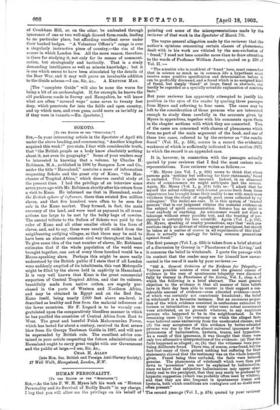[TO THE EDITOR OF THE "SPECTATOR."]
SIR,—May I make one or two trifling additions to your correspondent's letter on this subject in the Spectator of April 11th? He seems to me to lay too little stress on the really vital feature in any local organisation of scouts,— intelligence. It is not enough to know "ways," or even to have every little lane and alley by heart. Many of the thousands of cyclists who scattered over the country this Easter, to say nothing of the inhabitants themselves, possess that knowledge in a high degree. But how many of them could answer such a question as—" Supposing that I occupy such-and-such a position, and that there are such- and-such roads within a radius of so many miles, are any of these roads of a nature to afford the enemy great advantage if I do not guard them ?" That will be the question a commanding officer will often want answered. The country is well mapped, and the general lie of it fairly well known ; add minute local knowledge, versed in the opportunities of cover, the state of roads, the actual condition from year to year of the regularly cut copses, and an enemy would find the land hostile indeed. But if the Volunteer officer or his guide only knows, for example, the several ways from Westerham Hill to Knockholt (to take two very important strategic posts covering London), he might, on the one hand, be surprised by long-distance firing from the opposite heights
of Crockham Hill, or, on the other, be ambushed through ignorance of one or two well-nigh disused farm-roads, leading to no particular place, but affording excellent cover under their banked hedges. "A Volunteer Officer's" range is over a singularly instructive piece of country,—the rim of the saucer in which London lies. All the more reason, therefore. is there for studying it, not only for its means of communi- cation, but strategically and tactically. That is a study demanding intelligence as well as minute knowledge ; but it is one which seems to have been stimulated by the details of the Boer War, and it may well prove an invaluable addition to the Guide scheme.—I am, Sir, &c., A KENTISH MAN.
[The "complete Guide" will also be none the worse for being a bit of an archaeologist. If, for example, he knows the old packhorse roads in Surrey and Hampshire, he will know what are often "covered ways" some seven to twenty feet deep, which penetrate far into the fields and open country, and up which men, and even guns, could move as invisibly as if they were in tunnels.—En. Spectator.]







































 Previous page
Previous page